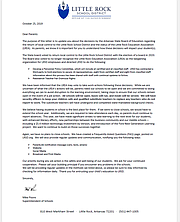NASHVILLE - Attorneys for conservative groups filed a legal challenge on Monday to Tennessee Gov. Bill Lee's decision to delegate authority to local governments to take actions - including mandating mask usage - to combat the spread of the coronavirus.
"However well-intentioned the delegation of power may have been, it is nonetheless illegal and unconstitutional and must be declared void," says the lawsuit, filed in Davidson County Chancery Court, on behalf of Citizens for Limited Government and Constitutional Integrity Inc., which are doing business as Tennessee Stands.
The lawsuit adds that "it is during times of emergency that our courts must endeavor to ensure that our constitutional rights are not diminished by arbitrary and capricious exercise of authority."
Lee's office had no immediate comment.
The lawsuit challenges the constitutionality of a state law, Section 58-2-107, arguing it violates Article I, Article II, Sections 2 and 3, Article III, Section 10, and Article VII, Section 1 of the Tennessee Constitution.
Lee has been criticized by many physicians over shying away from issuing a statewide mask mandate to curb the potentially deadly virus' ability to spread. But the Republican governor has granted the authority to mayors.
He did that first for six larger state counties, including Hamilton County, which run their own health departments to implement their own requirements for masks and in other areas. Hamilton County Mayor Jim Coppinger has implemented a mask mandate. Lee later extended the same authority to local mayors of the remaining 89 counties, which have state-run health departments.
Tennessee Attorney General Herbert Slatery in an April 27 legal opinion cited the section of state law now being challenged. Also a Republican, Slatery wrote that "just as the governor may exercise his authority under Tenn. Code Ann. § 58-2-107(a)(1) to delegate to a local governmental entity or to the local health department 'such powers as the governor may deem prudent,' the governor may exercise his emergency powers to expressly authorize, or recognize the authority of, county health departments to take action that may otherwise be inconsistent with his executive orders."
Some upset Republican lawmakers have objected to a number of Lee's executive orders, questioning his authority. Last week, a joint House and Senate "ad hoc" committee on the governor's emergency powers convened its first meeting, hearing from former Tennessee Supreme Court Justice William Koch and former U.S. Attorney General Alberto Gonzales.
Both told lawmakers that the Tennessee Constitution, court rulings and especially state laws grant governors wide authority, and that his executive orders on the coronavirus have the effect of law.
Gonzales said there is "not really a question" over whether Lee has the authority to do what he's done.
"Perhaps a better use, with all due respect, of the committee's time is to look at what limitations should there be," he said.
"I think it's important for the governor, the mayor or the president of the United States to have maximum flexibility to respond to a crisis," added Gonzales, who was with President George W. Bush on 9/11 when terrorists struck New York City's World Trade Center and the Pentagon in Washington, D.C., with hijacked planes. "It's really impossible to legislate in anticipation of anything that might happen."
But Gonzales said that "having said that, in return I think it's not unreasonable for the legislature to expect there be a full accounting for what the chief executive has done and why."
Koch noted that "emergencies don't create power."
"They mark an occasion where power has to be exercised," Koch said.
"His executive orders are entirely consistent with the inherent power in his office and with the power you granted him" in Tennessee's Emergency Powers Act, Koch said.
Other plaintiffs in the lawsuit are Gary P. Humble, founder and president of Tennessee Stands, which the lawsuit says was created "to inform Tennessee citizens of their constitutional rights and to defend against governmental overreach." Another plaintiff is Rodney H. Lunn Jr. Both are Williamson County residents.
The lawsuit was filed by Nashville attorney Gary Blackburn.
Contact Andy Sher at asher@timesfreepress.com or 615-255-0550. Follow on Twitter @AndySher1.
